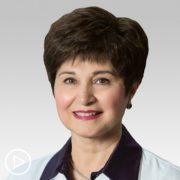Understanding Prostate Cancer Clinical Trial Phases and Types
Understanding Prostate Cancer Clinical Trial Phases and Types from Patient Empowerment Network on Vimeo.
How do prostate cancer clinical trials work? Dr. Sumit Subudhi shares what happens in each clinical trial phase and explains the function of open-label clinical trials, controlled clinical trials, randomized clinical trials, and double-blind randomized clinical trials.
Dr. Sumit Subudhi is an Associate Professor in the Department of Genitourinary Medical Oncology, Division of Cancer Medicine at The University of Texas MD Anderson Cancer Center. Learn more about Dr. Subudhi.
See More From Prostate Clinical Trials 201
Related Resources

|

What Should Prostate Cancer Patients Know About Clinical Trials? |

Tools for Choosing the Right Prostate Cancer Treatment Approach |
Transcript:
Katherine:
I’d like to define some clinical trial terminology to help patients further understand the process. Let’s start with the phases. What occurs during each phase?
Dr. Subudhi:
So, great question. Phase I is the safety phase. So, all we’re trying to do is find the right dose of the drug that is actually safe to give in the patients. And we’re looking for the maximum tolerated dose. And once we find that dose, then we use that dose to go to Phase II of the trial. And Phase II trials are looking at efficacy. So, looking to see whether the trial is giving you any clinical benefit, meaning the cancer’s shrinking or even disappearing.
Katherine:
Go on.
Dr. Subudhi:
And then the third phase is Phase III where you’re testing the current drug, experimental drug, to either standard of care or to a placebo to see whether or not you get a benefit, either a progression-free survival benefit or overall survival benefit. And so, those are the three phases of clinical trials.
Katherine:
What are the different types of clinical trials?
Dr. Subudhi:
So, they’re controlled trials. Actually, I should back up. So, there’s open-label trials where everyone that enrolls in the trial will get the experimental drug. So, there is no control arms in these trials. Then there is the control trials where you can either get the drug, or you may get a placebo or standard of care drug.
There are some trials that allow for crossover, meaning that if you’re in the placebo or standard of care arm, if your cancer progresses, you can actually cross over and get the experimental drug. But I just want to be clear that not all clinical trials have crossover. And if you’re in a control trial, I think that’s an important question to ask your doctors about that.
But the reason why we do the control trials is that we’ve learned that using historical controls – for example, we’re doing a lot of combination studies with chemotherapy, such as docetaxel (Taxotere), which was FDA-approved in 2004. So, if we’re using historical data from almost 20 years ago, it’s not the same thing as our patients that are being treated with docetaxel now, because their treatment landscape has changed so much, and our patients have changed so much.
And so, for that reason, control trials give us a better sense of how effective this experimental drug is doing as opposed to comparing it to a historical perspective.
Katherine:
What other types of clinical trials are available?
Dr. Subudhi:
So, there are a few other options. So, we talked about open-label where everyone’s guaranteed to get the drug. We talked about a controlled study where you will either get one drug or another. And another type is a randomized trial where a computer decides whether or not you’re going to actually get one drug versus another. It’s not your doctor because a lot of people think that I’m making that decision, and I’m not. It’s actually a random computer.
And some trials have 1:1 ratio, meaning a 50 percent chance that you’ll get the experimental drug versus the control drug. But other trials have 1:2 ratio or 1:3 ratio. So, that’s something that, again, you have to ask your physician of how these trials are being randomized.
Katherine:
Well, in a randomized clinical trial, the patient isn’t going to know what drug they’re being given.
Dr. Subudhi:
Actually, that’s not true.
Katherine:
Oh, it’s not.
Dr. Subudhi:
So, you bring up a great question. So, there’s a double-blind randomized clinical trial where not only the patient doesn’t know, but even the physicians and the nurses. No one except for the pharmaceutical company that’s running the trial actually knows who’s actually getting which drug. And it’s only towards the end of the trial that we unblind, and then we share that information. Well, the pharmaceutical company first shares it with the medical team who then shares it with the patient.
Katherine:
Are there other common clinical trial terms that you think patients should know about and understand?
Dr. Subudhi:
I think for now those are…
Katherine:
…they’re the most important?
Dr. Subudhi:
I think to me those are the most important. And I think that sometimes too much information can bog us down.
Katherine:
Well, speaking of information, there is a lot out there, some of which may not be very reliable. And that could lead many patients to having misconceptions about clinical trials. Let’s walk through a few common concerns we’ve heard from our community about trials.
One frequent question is – will I receive a placebo instead of a real treatment? And, first, I’d like you to define placebo. And should this be a concern for patients?
Dr. Subudhi:
Right. So, placebo is a drug that looks similar to the experimental drug. For example, if the experimental drug is a blue pill, then the placebo will be a blue pill. But it will be a pill that should have no known biological activity.
If the experimental drug is given intravenously and you get it in a liquid bag, then the placebo will also come in a liquid bag. So, it will look the same. And that’s why both the medical team as well as the patients or their families will not know which drug the patients have received, meaning the experimental drug or the placebo. But the placebos are meant to not have any biological activity.
Katherine:
So, it shouldn’t be a concern to patients then.
Dr. Subudhi:
Well, the concern that most of my patients share with me when they hear about placebo-controlled trials is, “Well, if I’m not going to get the experimental drug, why should I do this? I mean what benefit does it have for me?” And so, I tell them that one of the benefits is that we are watching you very carefully.
Because we don’t know sometimes which drug you’re getting. But in some control trials, like a randomized control trial, we will know because I’m not blinded.
If you’re in the arm that’s only getting chemotherapy, well, you know you’re not getting an oral pill. So, it’s very clear to the patient what they’re getting. But if they’re getting an oral pill that’s a placebo, we’re watching them very carefully.
So, we’re watching the patients very carefully in these placebo-controlled trials. And they’re coming in often so that we’re not going to miss any devastating things happening from the cancer. In fact, we’ll pick it up earlier than if they were just getting a standard of care outside of a trial. And for that reason I tell that my patients, “Don’t be worried.” And I always make sure that I have a backup plan.
So, the backup plan is either they’re going to cross over, meaning the trial allows for them to cross over to get the experimental drug. Or I have another trial that I know that they will qualify for. Or the third alternative is that I actually have a standard of care drug that I’m ready to give them the second I have it so that they don’t have to have those concerns.









